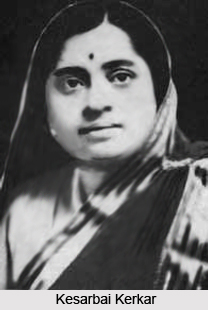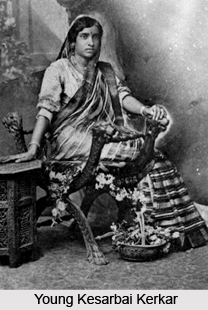 Kesarbai Kerkar was an Indian classical singer and vocalist, who belonged to the Jaipur-Atrauli Gharana. Kerkar is considered amongst the most excellent and influential Indian classical singers of the 20th century. Kesarbai Kerkar trained under the wings of Ustad Abdul Karim Khan, and later under Pt. Bhaskarbua Bhakle and Pt. Ramakrishnabua Vaze. Later, in Bombay (now Mumbai), she rigorously trained under Ustad Alladiya Khan. The Ustad was initially inhibited to take her as his disciple due to his personal reasons, but was later assured of her exceptional talent. She started excelling in every genre of classical singing, and had an unusual style of masculinity within her tone, standing apart from her other female counterparts.
Kesarbai Kerkar was an Indian classical singer and vocalist, who belonged to the Jaipur-Atrauli Gharana. Kerkar is considered amongst the most excellent and influential Indian classical singers of the 20th century. Kesarbai Kerkar trained under the wings of Ustad Abdul Karim Khan, and later under Pt. Bhaskarbua Bhakle and Pt. Ramakrishnabua Vaze. Later, in Bombay (now Mumbai), she rigorously trained under Ustad Alladiya Khan. The Ustad was initially inhibited to take her as his disciple due to his personal reasons, but was later assured of her exceptional talent. She started excelling in every genre of classical singing, and had an unusual style of masculinity within her tone, standing apart from her other female counterparts.
Early Life of Kesarbai Kerkar
Kesarbai Kerkar was born on 13th July, 1892, into a Kalawant family, in the village of Keri in the Ponda taluka, near Panaji, of Goa. At the age of 8, Kerkar shifted to Kolhapur, where she trained with Abdul Karim Khan, for 8 months. After returning to Goa, Kerkar studied under Ramkrishnabuwa Vaze. Kesarbai Kerkar moved to Mumbai at the age of 16 and eventually became a student of Ustad Alladiya Khan. Alladiya was a demanding and meticulous teacher. Soon enough, the Ustad realized that Kesarbai was an apt and sincere student. He made her practice for 8 to 10 hours a day for a long period of time making her repeat note-exercises several times until she attained perfection. She belonged to the Gomantak Maratha Samaj.
Career of Kesarbai Kerkar
Kesarbai Kerkar always believed in singing for class and not for the mass. She thus restricted her concerts only within intellectual audience, with the faith that music should never be compromised under any circumstances. Her music achieved appreciation from Rabindranath Tagore, who hailed her as Surashri, a title that struck, in a very eloquent piece after hearing her in 1938. Her music was only heard by the connoisseurs and people of eminence, for she had a conceited disdain for singing to the general public. Scrupulousness, fastidiousness and a lofty disdain of public approval remained the hallmarks of her personality and music.
 However, the present age has very few records available in the market that gives one a clear idea of her voice, style of singing and approach. From the few, though significant, commercial recordings, it becomes clear that hers was a crystal-clear, full-throated and compact voice capable of touching all the 3 registers effortlessly. Her lovely patterning and penchant for Aakaar or open-voice singing in an unbroken manner, punctured by subtle modulations, gave her singing a strong sense of continuity. Her Taans have been justly eulogised for their clarity, energy and their gushing quality by many of her contemporaries. As with most in her gharana, she specialised in singing rare and compound Ragas with masterly ease.
However, the present age has very few records available in the market that gives one a clear idea of her voice, style of singing and approach. From the few, though significant, commercial recordings, it becomes clear that hers was a crystal-clear, full-throated and compact voice capable of touching all the 3 registers effortlessly. Her lovely patterning and penchant for Aakaar or open-voice singing in an unbroken manner, punctured by subtle modulations, gave her singing a strong sense of continuity. Her Taans have been justly eulogised for their clarity, energy and their gushing quality by many of her contemporaries. As with most in her gharana, she specialised in singing rare and compound Ragas with masterly ease.
HMV released a three-minute recordings of her several Ragas. Of these her Lalit, Desi, Todi, Gaud Malhar, Nat Kamod, Lalita Gauri and Poorya Dhanashri reveal aspects of her Gayaki. The RPG Heritage series consists of longer live recordings. Her Lalit, Khokar and Malkauns show her in excellent control. Her Khokar, a specialty of her gharana, is breathtaking, for it gives one a good sense of her intricate and undulating Taans, her compact mode of singing and the robust resonance and volume pf her voice. Likewise, her Nat Kamod is also an excellent vignette of her art.
Awards and Achievements of Kesarbai Kerkar
Kesarbai Kerkar received the Padma Bhushan from the Indian government of in 1969. She was also bestowed with the title of Rajya Gayika, by the State Government of Maharashtra, in the same year. She is also honoured by the University of Mumbai as an annual music scholarship is given in her name to a deserving student. The Surashree Kesarbai Kerkar Smriti Sangeet Samaroha music festival in Goa is also organised in her memory in every November. Her song, Jaat Kahan Ho, is also included in the Voyager Golden Record, which was sent into space aboard the Voyager 1 and 2 spacecrafts in 1977. Kesarbai was widely honoured and feted during her years of glory.
Retirement and Death of Kesarbai Kerkar
She gave up public performances from 1967 onwards, owing to her advanced years and declining powers. She was wholly content to move out of public memory in the decade that followed and live as a recluse. Only her contemporaries saw the yawning gulf in the world of Hindustani music following her death in 1977. The dignity and depth she brought to khayal singing proved inspiring to several singers who followed close behind.
Today, her Gayaki lives through her one and only disciple, Dhondutai Kulkarni, a highly gifted, though sadly sidelined, scion of the Kesarbai style. In her family village of Keri, a school, the Surashree Kesarbai Kerkar High School, has been established in her honour.




